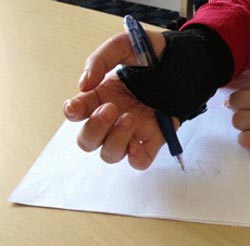Hand surgery enhances life quality for those with spinal cord injuries

Photo shows a patients grip before surgery.<br>Photo: The University of Gothenburg
Despite this, the operation is not frequently performed, either in Sweden or elsewhere. Researchers at the Sahlgrenska Academy, University of Gothenburg, Sweden are now hoping to change that.
A cervical spinal cord injury entails paralysis in both arms and legs, severely limiting daily life for its victims. Previous studies have shown that the capability that those with cervical spinal cord injuries most wish to recover is a functioning hand.
At the Sahlgrenska University Hospital, since the 1970’s, it has been possible to improve the gripping ability for these individuals by surgical means, and at present an estimated 40 per cent of all spinal cord injury patients in Sweden undergo this operation.
The PhD student Johanna Wangdell, who also works as an occupational therapist, has in the course of her thesis interviewed (all those) patients who have had their hand function reconstructed at the Sahlgrenska University Hospital since 2003.
The thesis shows that this hand surgery, in a dramatic way, enhances the life quality of those with spinal cord injuries:
“The surgery doesn’t only deliver a physical benefit in the form of increased gripping strength. The ability to eat independently, to carry out household chores and leisure activities offers mental rewards which benefit our social life, our daily habits and the roles we perform. Knowing that you can handle things yourself, of getting back your private life and restoring your identity as active parent, for example, or the guy that can go along for a beer with his mates is, in many cases, invaluable,” says Johanna Wangdell.
Besides the individual progress this represents, reconstructive hand surgery also means that the requirement for personal assistance and specially adapted housing can be reduced and this can deliver savings for society as a whole.
Despite this, the hand surgery is performed only to a very modest extent outside Sweden: whereas four out of ten victims of spinal cord injuries are operated in Sweden only one out of ten undergo the surgery in the USA.
“Few clinics in the world undertake as many operations per year of this type as the Sahlgrenska University Hospital. This means that victims of spinal cord injuries from across Europe come to the hospital for this surgery,” explains Johanna Wangdell.
“This is the first study that focuses on the patient viewpoint and we can demonstrate that those who undergo this surgery experience a really high level of satisfaction. I hope that my studies will contribute to the surgery becoming available much more widely, both in Sweden and the rest of the world.”
Contact:
Johanna Wangdell,
PhD Student at the Institute of Clinical Sciences, Sahlgrenska Academy at The University of Gothenburg, and registered Occupational Therapist at the Department of Hand Surgery / Spinal Cord Injury Unit, Sahlgrenska University Hospital
Tel: + 46 31-342 92 65
Mobile: +46 702-99 21 12
johanna.wangdell@vgregion.se
Media Contact
All latest news from the category: Health and Medicine
This subject area encompasses research and studies in the field of human medicine.
Among the wide-ranging list of topics covered here are anesthesiology, anatomy, surgery, human genetics, hygiene and environmental medicine, internal medicine, neurology, pharmacology, physiology, urology and dental medicine.
Newest articles

Sea slugs inspire highly stretchable biomedical sensor
USC Viterbi School of Engineering researcher Hangbo Zhao presents findings on highly stretchable and customizable microneedles for application in fields including neuroscience, tissue engineering, and wearable bioelectronics. The revolution in…

Twisting and binding matter waves with photons in a cavity
Precisely measuring the energy states of individual atoms has been a historical challenge for physicists due to atomic recoil. When an atom interacts with a photon, the atom “recoils” in…

Nanotubes, nanoparticles, and antibodies detect tiny amounts of fentanyl
New sensor is six orders of magnitude more sensitive than the next best thing. A research team at Pitt led by Alexander Star, a chemistry professor in the Kenneth P. Dietrich…





















